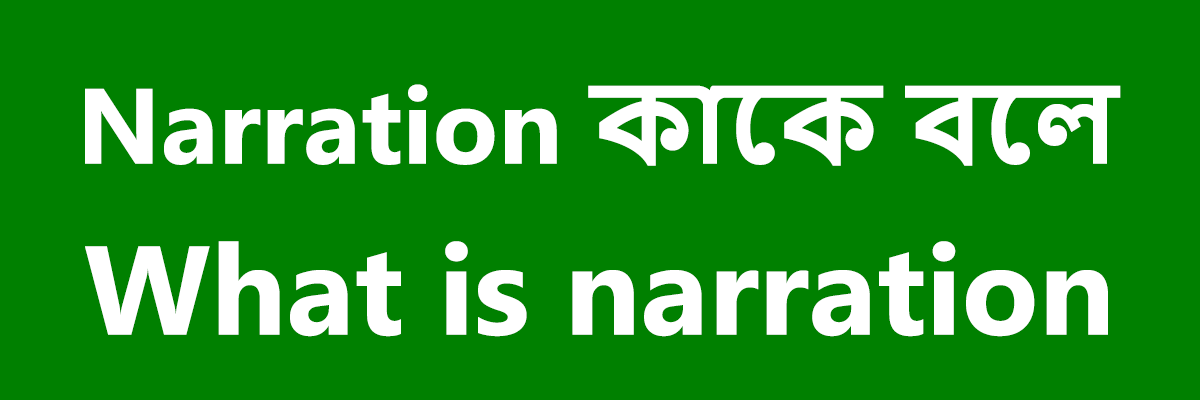
Narration rules in bangla
একজনের সংবাদ, বক্তব্য ও অনুরোধ অন্য কাউকে জানানোকে Narration Change বলে । আমরা বক্তার বক্তব্যকে Direct ও Indirect এই দুভাবে Report করতে পারি । Direct Narration : বক্তার নিজস্ব কথা উদ্ধৃত করলে তাকে Direct Narration বলে । Indirect Narration : বক্তার নিজস্ব কথা উদ্ধৃত না করে তার বক্তব্যকে Report করলে তাকে Indirect Narration বলে । যেমন :
Sima says, "I am ill".(Direct speech)
Sima says that she is ill.(Indirect speech)
Narration এর দুটি অংশ থাকে । যথা : Reporting অংশ এবং Reported অংশ ।
Reporting : Inverted Comma এর বাইরের অংশকে Reporting Speech বলে এবং এদের Verbকে Reporting Verb বলে । যেমন :
He said, "we are all sinners".
এখানে He said কে Reporting Speech বলে এবং said কে Reporting Verb বলে ।
Reported : Inverted Comma এর ভেতরের অংশকে Reported Speech বলে এবং এদের Verbকে Reported Verb বলে । যেমন :
He said, "we are all sinners".
এখানে we are all sinners কে Reported Speech বলে এবং are কে Reported Verb বলে ।
Narration পরিবর্তন করার জন্য আমাদেরকে কয়েকটি বিষয় সম্পর্কে ধারণা রাখতে হবে । বিষয়গুলো নিচে আলোচনা করা হলো : (i) যে উক্তিটি লেখার সময় Quotation marks বা Inverted comma এর মধ্যে থাকে তাকে Direct speech এবং যে Verb এর সাহায্যে ঐ উক্তিটি প্রকাশ করা হয় তাকে Reporting Verb বলে । অবশ্য Dialogue এ প্রায়ই Inverted comma থাকে না । (ii) Reporting Verb এর পর একটি Comma বসে । অবশ্য Dialogue এ কমার দরকার পড়ে না । (iii) Direct speech এর প্রথম অক্ষরটি Capital Letter হয় । একটি Table এর সাহায্যে বিষয়টি পরিষ্কার করা হলো :
| Speaker | Reporting verb | Direct speech |
|---|---|---|
| Rahim | said, | "I am very busy." |
| Reporter | Reporting verb | Linker | Reported speech |
|---|---|---|---|
| Rahim | said | that | he was very busy. |
Inverted comma এর অন্তর্গত বা Reported speech এর অন্তর্গত First person সবসময় Reporting verb এর Subject ও Person অনুযায়ী পরিবর্তিত হবে । যেমন :
Direct : He says, "I am busy."
Indirect : He says that he is busy.
এখানে Reported speech এর First person 'I' Reporting verb (He) অনুসারে পরিবর্তিত হয়েছে । Reporting speech এর অন্তর্গত Second person সবসময় Reporting verb এর Object অনুযায়ী পরিবর্তিত হবে । যেমন :
Direct : Rahim said to him, "You should be more careful."
Indirect : Rahim told him that he should be more careful.
এখানে Reported verb এর Object 'him' অনুযায়ী Reported speech এর you পরিবর্তিত হয়েছে ।
Reported speech এর অন্তর্গত Third person এর কোন পরিবর্তন হয় না । যেমন :
Direct : Nilima says, "Niloy is busy"
Indirect : Nilima says that Niloy is busy.
এখানে Reported speech এ Third person থাকায় কোন পরিবর্তন হয় নি ।
Direct থেকে Indirect করার সময় Indirect speech এর পূর্বে একটি Linker বা সংযোজক ব্যবহার করতে হয় । যেমন :
Direct : He said, "I am ill".
Indirect : He said that he was ill.
অর্থ ও Subject অনুযায়ী Pronoun গুলো পরিবর্তন করতে হয় । যেমন :
Direct : He says, "I am playing cricket".
Indirect : He said that he is playing cricket.
Direct speech এ Reporting verbটি Past tense এ থাকলে আমাদের নিম্নলিখিত পরিবর্তনগুলো আনতে হবে :
| Direct reported verb | Indirect reported verb |
|---|---|
| Present Indefinite Tense | Past Indefinite Tense |
| Present Continuous Tense | Past continuous Tense |
| Present Perfect | Past Perfect |
| Present Perfect continuous | Past Perfect continuous |
| Past Indefinite | Past Perfect |
| Past continuous | Past Perfect continuous |
| Past Perfect | Past Perfect |
| Past Perfect continuous | Past Perfect continuous |
| Future (Shall/Will) | Should/Would |
| Must | Had to |
Reported speechটি চিরন্তন সত্য বা অভ্যাসগত কর্ম প্রকাশ করলে Reported verbটির কোন পরিবর্তন হয় না ।
Reporting verbটি Past tense এ থাকলে সময় বা স্থানবাচক কিছু শব্দের পরিবর্তন হয় । নিচে টেবিলে বিষয়টি তুলে ধরা হলো :
| Direct | Indirect |
|---|---|
| This | That |
| These | Those |
| Here | There |
| Ago | Before |
| Come | Go |
| Thus | That way |
| Hither | Thither |
| Thus | So |
| Tonight | That night |
| Last night | The previous night |
| Today | That day |
| The same day | The following day |
| Tomorrow | The next day |
| Yesterday | The previous day |
| Yesterday morning | The previous morning |
| Last month | The previous month |
| Tomorrow morning | The next morning |
| Next week | The following week |
| Hence | Thence |
| Now | Then |
Assertive
Interrogative
Imperative
Optative
Exclamatory



